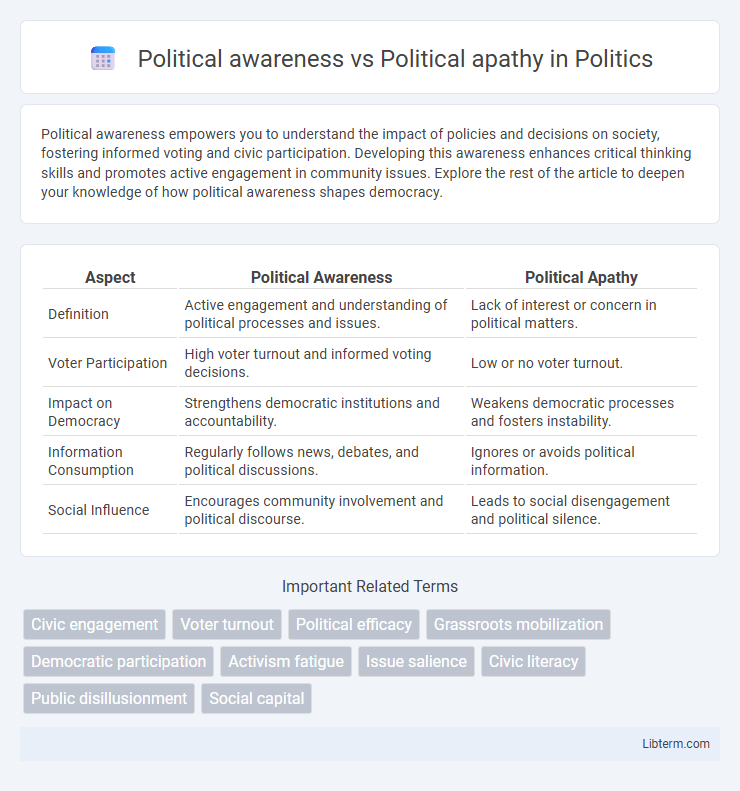Political awareness empowers you to understand the impact of policies and decisions on society, fostering informed voting and civic participation. Developing this awareness enhances critical thinking skills and promotes active engagement in community issues. Explore the rest of the article to deepen your knowledge of how political awareness shapes democracy.
Table of Comparison
| Aspect | Political Awareness | Political Apathy |
|---|---|---|
| Definition | Active engagement and understanding of political processes and issues. | Lack of interest or concern in political matters. |
| Voter Participation | High voter turnout and informed voting decisions. | Low or no voter turnout. |
| Impact on Democracy | Strengthens democratic institutions and accountability. | Weakens democratic processes and fosters instability. |
| Information Consumption | Regularly follows news, debates, and political discussions. | Ignores or avoids political information. |
| Social Influence | Encourages community involvement and political discourse. | Leads to social disengagement and political silence. |
Understanding Political Awareness: Definition and Importance
Political awareness involves an in-depth understanding of political systems, policies, and current events, which empowers individuals to make informed decisions and participate effectively in democratic processes. High political awareness fosters civic engagement, promotes accountability, and strengthens democratic institutions by ensuring citizens are active participants rather than passive bystanders. Understanding the importance of political awareness is crucial for addressing political apathy, as informed citizens are more likely to vote, advocate for social change, and hold leaders accountable.
The Roots and Rise of Political Apathy
Political apathy stems from factors like disillusionment with corrupt governance, lack of political education, and perceived inefficacy of individual votes, leading to diminished civic engagement. Media sensationalism and complex political systems further alienate citizens, deepening their disengagement. The rise of political apathy correlates strongly with social inequality and weakened trust in institutions, undermining democratic participation.
Key Differences Between Political Awareness and Apathy
Political awareness involves active engagement with current events, understanding political processes, and informed decision-making, while political apathy is characterized by indifference, lack of interest, and disengagement from political activities. A key difference lies in participation; politically aware individuals vote, discuss policies, and advocate for change, whereas apathetic citizens abstain from voting and avoid political discourse. Awareness fosters democratic accountability and influence, contrasting sharply with apathy's tendency to weaken civic responsibility and lower voter turnout.
Factors Influencing Political Engagement
Political engagement is shaped by factors such as education level, socioeconomic status, and access to information, which increase awareness and participation. Conversely, political apathy often stems from distrust in government, perceived inefficacy of voting, and lack of civic education, leading to disengagement. Media exposure and community involvement also play critical roles in either fostering active political awareness or reinforcing apathy.
Effects of Political Apathy on Democracy
Political apathy undermines democratic processes by decreasing voter turnout and weakening civic engagement, which can lead to unrepresentative governance and policy decisions that do not reflect the electorate's needs. This disengagement fosters political polarization and diminishes accountability, as elected officials may exploit the lack of public scrutiny. Sustained political apathy erodes trust in democratic institutions, threatening the stability and legitimacy of the political system.
Benefits of Promoting Political Awareness
Promoting political awareness enhances informed citizen participation, leading to more representative democratic outcomes and stronger accountability of elected officials. Increased political knowledge empowers individuals to critically evaluate policies, advocate for community needs, and resist manipulation by misinformation. Higher political engagement contributes to social cohesion and fosters a more vibrant, responsive political system that reflects diverse voices.
The Role of Education in Shaping Political Attitudes
Education plays a crucial role in shaping political attitudes by increasing political awareness and reducing political apathy among citizens. Comprehensive civic education programs enhance understanding of political systems, encourage critical thinking about governance, and promote active participation in democratic processes. Studies show that individuals with higher levels of educational attainment are more likely to engage in voting, political discussions, and community involvement, which strengthens democratic accountability and societal trust.
Media Influence: Fueling Awareness or Apathy?
Media influence shapes political awareness by providing access to diverse information, enabling citizens to make informed decisions and engage in democratic processes. Conversely, sensationalism, misinformation, and biased reporting in media can fuel political apathy by fostering distrust and disinterest among the public. The balance between credible journalism and media manipulation significantly impacts voter turnout and civic participation rates worldwide.
Strategies to Combat Political Apathy
Boosting political awareness requires targeted education campaigns and community engagement initiatives that highlight the impact of civic participation on policy outcomes. Leveraging social media platforms and interactive tools can increase voter turnout by providing accessible information and encouraging dialogue among diverse demographics. Collaborations between educational institutions and advocacy groups foster critical thinking skills, empowering individuals to overcome political apathy through informed decision-making.
The Future of Political Participation: Trends and Challenges
The future of political participation is shaped by increasing political awareness driven by digital media, which enhances voter engagement and informed decision-making. Conversely, political apathy persists among younger generations, fueled by distrust in institutions and perceived inefficacy of voting, posing challenges to democratic processes. Addressing these trends requires innovative strategies to foster civic education and rebuild trust to ensure robust democratic participation globally.
Political awareness Infographic

 libterm.com
libterm.com